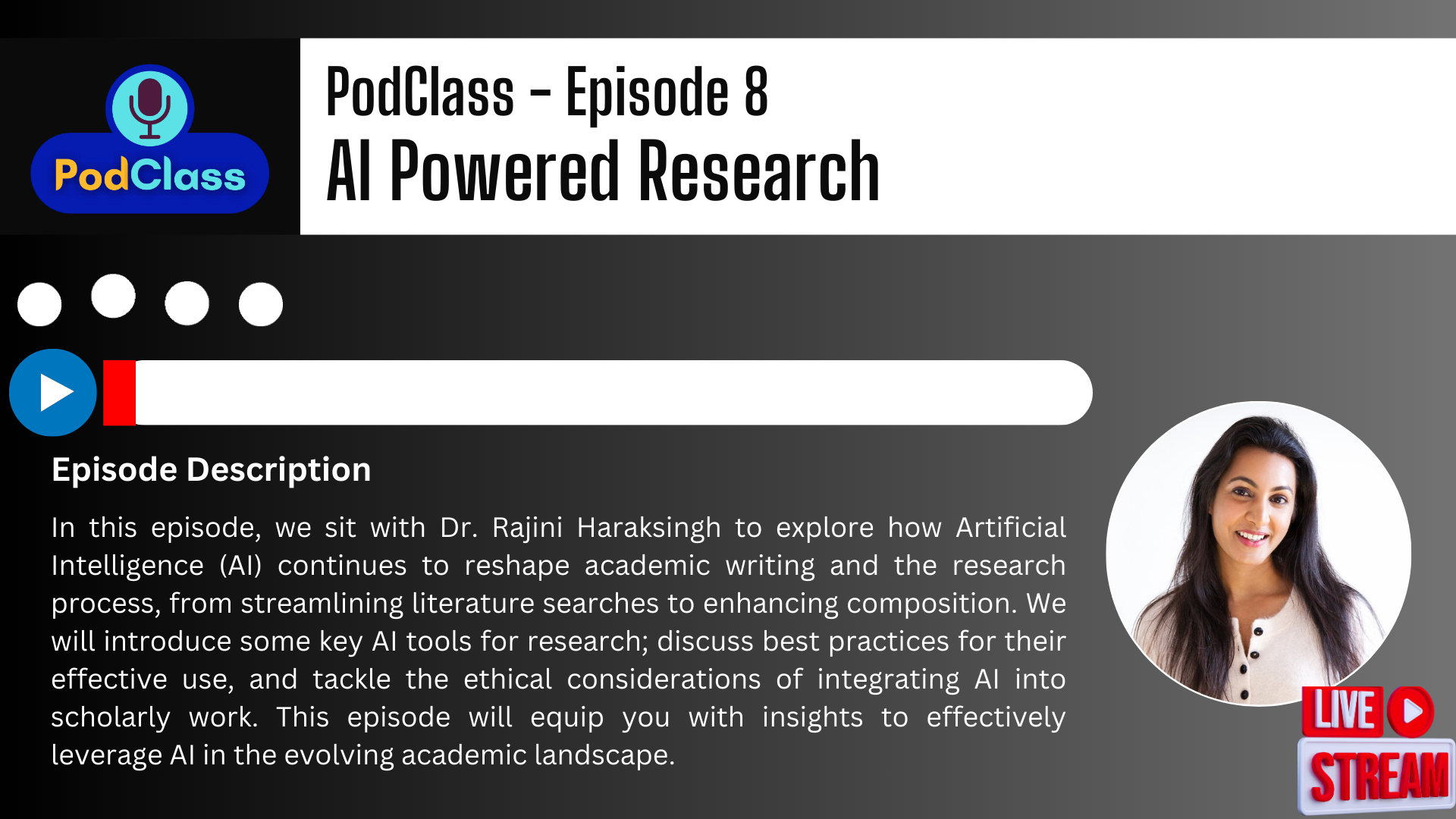Good day Colleagues,
Welcome back to our TTT Blog, a place where we provide you with the current tips and resources that support you in teaching excellence.
This week, as we embark upon the mid-semester phase, we would like to explore research and the power of artificial intelligence (AI). The integration of AI in Higher Education has profoundly impacted various processes and outputs by essentially changing the way many things are done, created or managed. This change ranges from the way course curricula are designed, to the implementation of learning activities and creation of teaching and learning artifacts, and assessments. Moreover, AI has significantly impacted academic research in many ways, thus becoming a very capable research assistant. There is an array of AI research tools that may assist you in various parts of your research such as the provision of sources for literature reviews and conducting data analyses, thus saving the researcher (you) time to complete other tasks.
A – How Can AI Support Research
From identifying patterns in large datasets that the human eye may miss, to generating new hypotheses and testing research questions, AI provides numerous benefits that essentially help to streamline the research process, and thereby making research much more efficient. Here are a few ways in which AI can support research:
-
Literature Review and Synthesis of Information: The power of AI can efficiently scan through large volumes of research publications such as research papers, articles, journals etc. To this end, it helps to identify relevant studies, extrapolate pertinent information, and summarize data-based findings. In so doing, AI may help researchers stay abreast on the latest research in their fields.
-
Hypothesis Generation: AI has the power to analyze existing data, and can suggest new hypotheses for further investigation. This is essential in stimulating new or more innovative research directions.
-
Data Analysis and Presentation: AI algorithms, particularly machine learning models (i.e. a branch of AI focused on building computer systems that learn from data), can analyze a wide range of data to uncover hidden patterns, trends, and correlations that might not be apparent to human researchers. Moreover, AI can create visually appealing and informative graphs and charts to effectively communicate research findings.
-
Research Writing and Editing: AI tools such as Grammarly, Quillbot or regular chat-bots can help with writing research papers by suggesting improved language, checking for grammar errors, and ensuring consistency in style.
B – AI Tools for Research
More than just chat-bots such as Claude, Copilot or Gemini, there is a plethora of AI tools that may be useful to researchers, providing them with some of the aforementioned benefits. The following Table identifies a few of these tools along with a brief description and other details for each:
AI-Powered Research Tools |
||||
AI Tool |
Description |
Underlying Data |
Free? |
Further Information |
Research Rabbit |
A citation-based mapping tool that emphasizes the relationships between research works. It uses visualizations to help researchers find similar papers and other researchers in their field. |
Semantic Scholar, Open Alex etc |
Free |
FAQs |
Connected Papers |
Like Research Rabbit, Connected Papers focuses on the relationships between research papers to find similar research content. You can also use this tool to get a visual overview of an academic field. |
Semantic Scholar |
Free with paid subscriptions available. |
FAQs |
Scholarcy |
Summarizes key points and claims of articles into ‘summary cards’ that researchers can read, share, and annotate when compiling research on a given topic. |
Research papers uploaded by researchers. |
Free with paid subscriptions available. |
FAQs |
Consensus |
Uses large language models (LLMs) to help researchers find and synthesize answers to research questions, focusing on the scholarly authors’ findings and claims in each paper. |
Semantic Scholar |
Free with paid subscriptions available. |
FAQs |
Semantic Scholar |
This platform, which supplies underlying data for many of the other tools, provides brief summaries of the main objectives and results of papers. |
Semantic Scholar |
Free |
FAQs |
C – Key Considerations
While AI offers an array of avenues and benefits, including efficiency of the research process, it is important to avoid relying entirely on one AI tool for your entire research. The following are additional guidelines you may consider to maximize the benefits of AI in your research:
-
Data Quality: The quality of AI results relies heavily on the quality of training data it uses, there is also the possibility of hallucinations in some instances (though generally minimal). As such, you must ensure that the output is accurate and representative data.
-
Interpretations: Understanding how AI models reach their conclusions is essential for validating research findings and addressing potential biases.
-
Ethical Factors: Researchers should be aware of potential ethical issues related to data privacy, biases, and responsible AI development and use.
D – Additional Resources
Click Here to register for this PodClass Episode
To further equip you in maximizing the benefits of AI in your research, the CETL is happy to announce its upcoming PodClass: Episode 6 – AI Powered Research. This podcast episode is designed sensitize you the power of AI in research.
We hope the aforementioned resources are helpful.
Should you need any further assistance, please feel free to contact us.
Regards,
The Centre for Excellence in Teaching & Learning (CETL),
The University of the West Indies (UWI),
St. Augustine.


